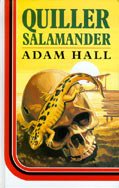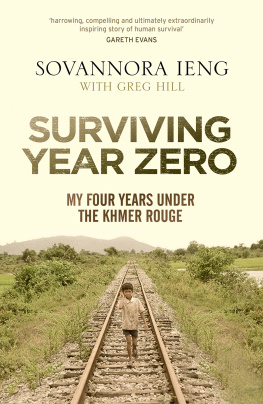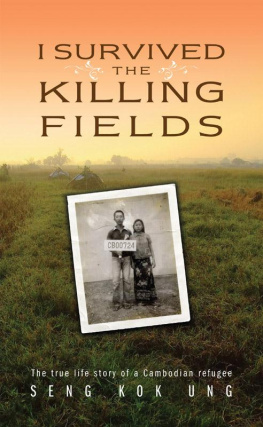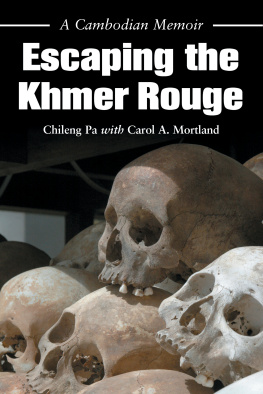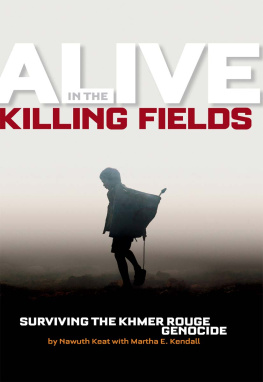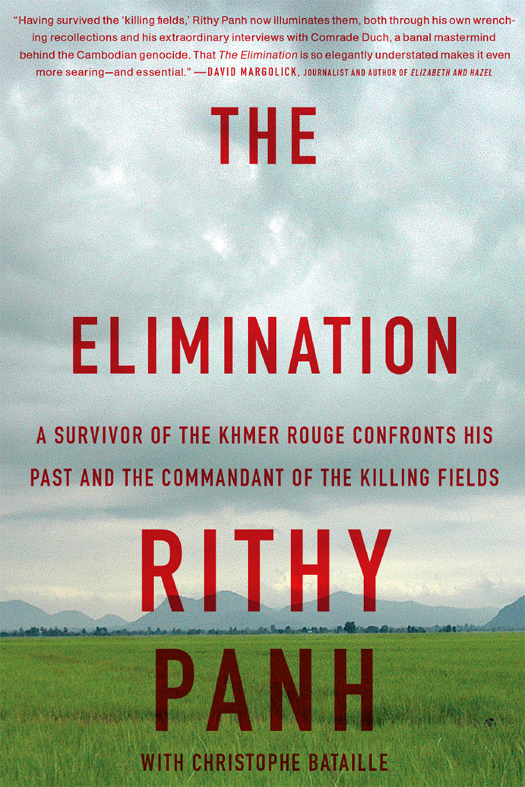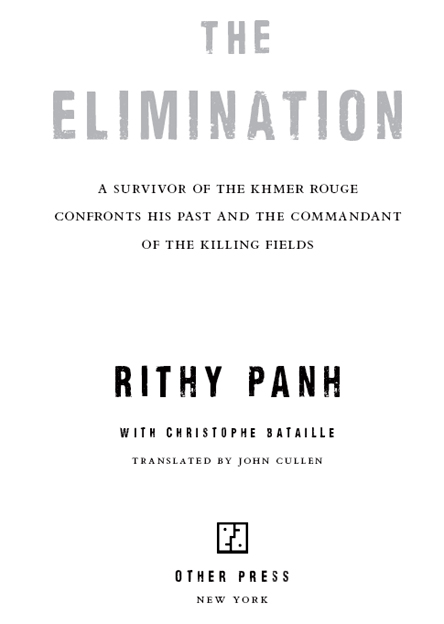Copyright ditions Grasset & Fasquelle, 2012
Originally published in French as Llimination by ditions Grasset & Fasquelle.
Translation copyright 2012 John Cullen
This work, published as part of a program providing publication assistance, received financial support from the French Ministry of Foreign Affairs, the Cultural Services of the French Embassy in the United States, and FACE (French American Cultural Exchange).
French Voices logo designed by Serge Bloch.
Production Editor: Yvonne E. Crdenas
All rights reserved. No part of this publication may be reproduced or transmitted in any form or by any means, electronic or mechanical, including photocopying, recording, or by any information storage and retrieval system, without written permission from Other Press LLC, except in the case of brief quotations in reviews for inclusion in a magazine, newspaper, or broadcast. For information write to Other Press LLC, 2 Park Avenue, 24th Floor, New York, NY 10016. Or visit our Web site: www.otherpress.com
The Library of Congress has cataloged the printed edition as follows:
Rithy Panh.
[limination. English]
The elimination : A survivor of the Khmer Rouge confronts his past and the commandant of the killing fields / by Rithy Panh with Christophe Bataille ; translated by John Cullen.
p. cm.
Originally published in French as Llimination by ditions Grasset & FasquelleT.p. verso.
eISBN: 978-1-59051-559-4
1. Rithy Panh. 2. Kang, Kech Ieu, 1942 3. Political refugeesCambodiaBiography. 4. Genocide survivorsCambodiaBiography. 5. Political atrocitiesCambodia. 6. Parti communiste du Kampuchea. 7. CambodiaPolitics and government19751979. I. Bataille, Christophe. II. Title.
DS554.83.R58A3 2013
959.6042092dc23
[B]
2012030140
v3.1
To my father, Panh Lauv
To Vann Nath
Contents
Duch: Mr. Rithy,
youve forgotten an even more important
slogan: The blood debt must be repaid by blood.
Im surprised: Why that slogan?
Why not one thats more ideological?
Duch fixes me with his eyes:
The Khmer Rouge were all about elimination.
Human rights didnt exist.
KAING GUEK EAV , known as Comrade Duch, was the commandant of Security Prison 21the S-21 torture and execution center in Phnom Penh, Cambodiafrom 1975 to 1979. He chose his nom de guerre, he explains, from a book he remembers reading in his childhood; in the book little Duch was a good boy.
At least 12,380 people were tortured in that prison. After the victims confessed, they were executed in the killing field of Choeung Ek (also under Duchs command), about ten miles southeast of Phnom Penh. In S-21 no one escaped torture. No one escaped death.
Were inside the walls of another prison, the one to which Duch was sentenced in 2010 by the ECCC, the Extraordinary Chambers in the Courts of Cambodia, a national court (better known as the Khmer Rouge Tribunal) backed by the United Nations.
He speaks to me in his soft voice, S-21 was the end of the line. People who got sent there were already corpses. Human or animal? Thats another subject.
I observe his face, the face of an old man, his large, almost dreamy eyes, his ruined left hand. I envision his younger features and discern the cruelty and madness of his thirties. I understand that he may have had the ability to fascinate, but Im not afraid. Im at peace.
SOME YEARS PREVIOUSLY , in preparation for my film S21: The Khmer Rouge Killing Machine, I conducted long interviews with guards, torturers, executioners, photographers, nurses, and drivers who had served under Duchs command. Very few of them have had to face legal proceedings. All of them are now free. Sitting in a former cell in S-21the torture center has been turned into a museumone of them blurts out, The prisoners? They were like pieces of wood. He laughs nervously.
At the same table, before a picture of Pol Pot, another one explains, Prisoners have no rights. Theyre half human and half corpse. Theyre not humans, and theyre not corpses. Theyre soulless, like animals. Youre not afraid to hurt them. We werent worried about our karma.
I ask Duch, too, if he has nightmares: from having authorized electrocutions, beatings with cords, the thrusting of needles under fingernails; from having made people eat excrement; from having recorded confessions that were lies; from having given orders to slit the throats of men and women lined up blindfolded at the edge of a ditch and deafened by a roaring generator. He considers for a while and then answers me with lowered eyes: No. Later, I film him laughing.

I DONT LIKE the overused word trauma. Today, every individual, every family has its trauma, whether large or small. In my case, it manifests itself as unending desolation; as ineradicable images, gestures no longer possible, silences that pursue me. I ask Duch if he used to dream at night in his cell in the tribunals prison. A man who has commanded a place like S-21, and before that M-13, another detention and execution center in the jungledoesnt such a man see in nightmares the agonized faces of his victims, calling to him and asking him why? The face, perhaps, of the young and beautiful Bophana, twenty years old, who was savagely tortured for several months?
As for me, ever since the Khmer Rouge were driven from power in 1979, Ive never stopped thinking about my family. I see my sisters, my big brother and his guitar, my brother-in-law, my parents. All dead. Their faces are talismans. I see my little nephew and niece againhow old are they? five and seven?starving, breathing with difficulty, staring into space, panting. I remember their last days, their knowing bodies. I remember helplessness. Childish lips closed tight. Duch seems surprised by my question. He thinks for a bit and then says simply, Dream? No. Never.
IF I CLOSE my eyes, still today, everything comes back to me. The dried-up rice fields. The road that runs through the village, not far from Battambang. Men dressed in black, outlined against the burning horizon. Im thirteen years old. Im alone. If I keep my eyes shut, I see the path. I know where the mass grave is, behind Mong hospital; all I have to do is stretch out my hand, and the ditch will be in front of me. But I open my eyes in time. I wont see that new morning or the freshly dug earth or the yellow cloth we wrapped the bodies in. Ive seen enough faces. Theyre rigid, grimacing. Ive buried enough men with swollen bellies and open mouths. People say their souls will wander all over the earth.
Now Im a man in my turn. Im far away. Im alive. I no longer remember names or dates: the village boss who used to go horseback riding in the country; the woman who was forced into marriage; the worksites where I slept; the loudspeakers blaring in the morning. I no longer know them. What wounds me has no name.
Im not looking for objective truth today; I just want words. Especially Duchs words. I want him to talk and explain himself. To tell his truth, to describe his path, to say what he was, what he wanted or believed himself to be. He has, after all, lived a life; hes living it now; hes been a man and even a child. I want this son of an incompetent, debt-ridden businessman, this brilliant student, this mathematics professor so respected by his own students, this revolutionary who still quotes Balzac and Alfred de Vigny, this dialectician, this chief executioner, this master of tortureI want him to answer me, and in so doing to take a step on the road to humanity.


